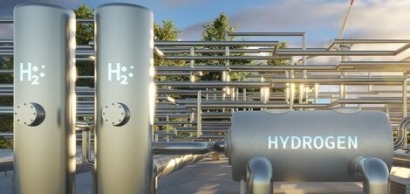
Currently, KOGAS is the world’s largest importer of liquefied natural gas (LNG) and transports the regasified fuel nationwide through its extensive high-pressure gas pipeline network.
The two-year project will assess the scope for blending hydrogen with natural gas in KOGAS’ 5,000-kilometre-long domestic transmission network. More specifically, DNV will assess the pipeline network’s suitability for hydrogen blending, provide technical and advisory support to KOGAS’s hydrogen blending test project on Jeju Island and provide support to KOGAS in addressing the requirements of South Korea’s regulatory authorities in overseeing hydrogen’s integration and uptake.
The work plan includes assessing and demonstrating the viability and impact of blending hydrogen with natural gas at various ratios in KOGAS’ transmission pipeline system, advising on the options, construction and operation of hydrogen injection facilities and equipment, reviewing methods for controlling the concentration of hydrogen blending for customers, providing on-site technical support and data analysis for the hydrogen demonstration project and supporting KOGAS in addressing the requirements of the energy regulator through the application of knowledge gained in related projects internationally.
DNV is working globally with an increasing number of gas pipeline companies to safely repurpose gas transmission and distribution networks for the integration of blended and 100 percent hydrogen gas. In addition, DNV’s Spadeadam research facility in the UK is conducting full-scale testing on the safe transportation of hydrogen in gas networks through to the appliances in homes.
“DNV’s global technical expertise across the entire hydrogen value chain, from production to end use, means we are uniquely placed to support the world’s largest LNG importer KOGAS in creating value from hydrogen while also helping South Korea transition to a decarbonized energy future” said Dr. Lim Dong Ho, South Korea Market Area Manager, Energy Systems at DNV.
Brice Le Gallo, Vice President and Regional Director APAC, Energy Systems at DNV, added that the company’s global hydrogen network of experts, which has grown in Asia in 2022, has already been involved in numerous hydrogen initiatives across the maritime and energy industries, putting DNV in a unique position to cover the whole hydrogen value chain and maintain relations with its key stakeholders.
DNV’s 2022 Energy Transition Outlook forecasts that hydrogen production for energy purposes will meet 9 percent of Asia-Pacific energy demand by 2050. Together with industry and governments, DNV is helping to solve the technical challenges associated with adopting hydrogen as a leading fuel in the energy transition, to accelerate its uptake and meet our climate goals.
Using imported LNG, natural gas is responsible for around 26 percent of South Korea’s power generation capacity, a share expected to grow to 31 percent by 2050 as coal and nuclear plants are phased out in accordance with South Korea’s 2050 Carbon Neutral Strategy and 9th Electricity Plan.
South Korea adopted the Hydrogen Economy Roadmap in 2019 and established the Hydrogen Economy Commission in 2021 to oversee the development of a fully-fledged hydrogen economy to decarbonise transport, power generation and industry while also driving economic growth and global industrial competitiveness.
Up to 2040, KOGAS is planning to invest $37 billion internationally to establish renewable power generation facilities that produce hydrogen which will be imported, stored and transported through a specialised hydrogen pipeline network.
South Korea sees hydrogen as a potential driver of job creation and economic growth worth 43 trillion won ($43 billion). It is targeting hydrogen use to grow from 5.26 million tons per annum (Mtpa) at present to over 130,000 Mtpa by 2040, helping to develop large-scale stationary fuel cell power generation facilities and fuel cell electric vehicles (FCEVs).
The country has the highest share of industrial energy demand of all IEA member countries at 55 percent and the third-largest public investment in hydrogen after Germany and Japan. Hydrogen blending will support the decarbonisation of South Korea’s manufacturing sector and is the backbone of the nation’s national hydrogen strategy.
For additional information:

